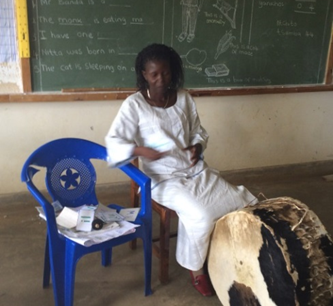
July 2014—When you ask Judith Phiri, a Standard 3, or third grade, teacher about her students, she breaks into a beaming smile. Teaching her hearing impaired students how to read was an uphill battle for years. She lacked resources and was constantly searching for ways to help her students. But now, things have changed.
“At last,” she says, “I have been able to climb up the mountain and get a glimpse of the mountain view.” Fittingly, Mountain View is the name of the school for the deaf where she teaches in Thyolo district in southern Malawi.
Phiri was looking for ways to help her students when the USAID/Malawi Early Grade Reading Activity (EGRA) invited her to a five-day training on effective early grade reading practices in August 2013. The training helped her find ways to adapt teaching techniques to the circumstances of her deaf students.
“My students need good language and reading models, access to adapted instruction, and appropriate teaching materials,” she explained. “Hence, I decided to modify what I had learned to best suit my students.”
Some of her creative adaptations included a semi-circular seating arrangement which allows students to see all class participants; a drum for signaling the class schedule; signals to indicate to her students who is speaking; and highlighting key words and concepts in printed text.
Phiri’s hard work has paid off. Due to difficulties with oral language, her students obtain skills at a pace that is on average three times slower than hearing students. But while it used to take a year, her students are now reading after just one term, or three months.
More than 13 percent of Malawian citizens live with some form of disability and over 85 percent live in rural areas, including Phiri’s students. People with disabilities are among the poorest and most vulnerable citizens in Malawi. They struggle against socio-cultural and economic discrimination and are unable to fully participate in society. They lack access to education, health and legal services, and are often denied the right to earn a living or participate in community decision-making.
Even in the best of circumstances, academic achievement in Malawi is very low. Malawi ranks last of the 15 countries participating in the Southern and Eastern Africa Consortium for Monitoring Education Quality III standardized test in literacy. This environment makes the situation for Phiri’s students that much more difficult.
EGRA helps teachers overcome these obstacles in a deceptively simple way, using resources that are already available in most schools. It encourages students to spend time on pre-reading skills that includes linking letters to sounds, then building syllables that are combined to make words. Phiri believes that this approach helps her students build a vocabulary base and improve their reading abilities.
“It feels good seeing your students succeed and overcome the challenge of their hearing status. My students are faring well.”
If the excitement on their faces as they read is any indication, Phiri’s students are determined to continue up that difficult path toward reading mastery.
The USAID/Malawi Early Grade Reading Activity is a three-year, $24 million program implemented by RTI International in August 2013. It promotes quality early grade reading instruction, the production of high-quality reading and learning materials in Chichewa and English, improved policy for reading at the national and local levels, and building a community of reading within and outside the school setting. An evaluation is currently under way to measure the impact of this intervention and how household factors and other USAID/Malawi activities affect reading scores in participating schools.
Links
Follow on Facebook







Comment
Make a general inquiry or suggest an improvement.